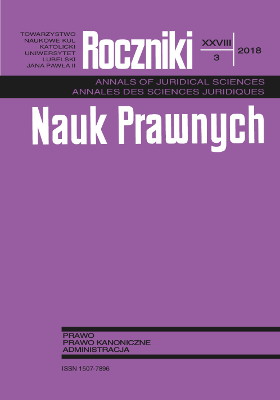Wymagania prawne dotyczące pobożnych rozporządzeń woli według Kodeksu Prawa Kanonicznego z 1983 roku
Legal Requirements Relating to Pious Dispositions According to the 1983 Code of Canon Law
Author(s): Paweł KaletaSubject(s): Law, Constitution, Jurisprudence, Canon Law / Church Law
Published by: Towarzystwo Naukowe KUL & Katolicki Uniwersytet Lubelski Jana Pawła II
Keywords: pious dispositions; an act inter vivos; an act mortis causa; a trust for pious causes
Summary/Abstract: This paper concerns the legal provisions on dispositions of pious causes included in the 1983 Code. The question which the Author addresses is: what are the legal requirements for the legitimate acceptation of pious causes. The content of the study shows that everyone is able freely to dispose of his or her goods for pious causes (can. 1299 § 1), if he or she has the capacity to carry out legal acts, without prejudice to the prescript of can. 668 § 5. There are three ways to carry out of pious dispositions: inter vivos (e.g. donation); 2) mortis causa (e.g. testament, last will, legate); and 3) trust for pious causes (can 1302). In order to accept dispositions for pious cause it should be observed not only canon law, but also civil law, without prejudice to the supervisory power of the Ordinary provided in can. 1301 §§ 1 and 3; can. 1302 §§ 1 and 2 and can. 1304.
Journal: Roczniki Nauk Prawnych
- Issue Year: 28/2018
- Issue No: 3
- Page Range: 209-228
- Page Count: 20
- Language: Polish

